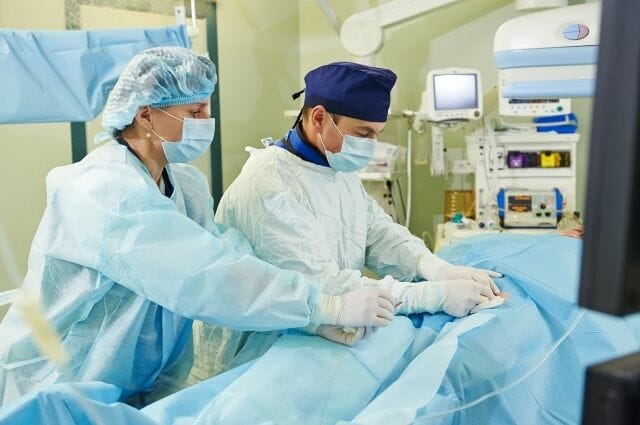7 Reasons To See A Vein Specialist

Think your vein problems are just a cosmetic issue? Vein specialists say no.
More than 30 million Americans suffer from venous disease, but only 10 percent seek treatment for it, according to the Society for Vascular Medicine.
About 20% of all adults will get varicose vein disorders, a type of vascular disease, at some point in their lives. And although these diseases are more common to older people, younger ones can have them too.
Sometimes, a vein disease can go unnoticed until it gets serious and dangerous. So, if you see any minimal signs of venous problems, don’t hesitate to consult a vein specialist before it gets worse.
Here are the signs that you need to see a vein doctor soon!
7 Signs That You Need To See A Vein Specialist

1. Leg Discomfort
Do you feel any burning, throbbing, heaviness, or pain in your legs? These discomfort symptoms indicate that you need vein treatment from a vein doctor.
Heavy legs, in particular, is one of the most significant signs of vascular problems such as chronic venous insufficiency (CVI).
CVI is usually caused by blood clots and varicose veins. While it may not be a serious condition at first, it could lead to serious complications later on such as venous stasis ulcers and other circulatory system problems.
2. Vein Discoloration
Another sign of possible vein disease is vein discoloration. The discoloration indicates that the blood is pooling due to venous insufficiency. This sign is most common to those with varicose veins and spider veins.
The discoloration usually occurs in the abdomen, legs, and feet when blood pools in the vessels instead of flowing back to the heart. Because of the blood pooling, the pressure inside the blood vessels tends to build up until a vessel leaks.
Vein discoloration can be a result of other vascular diseases aside from varicose veins and spider veins. Skin discoloration changes associated with any vein disease include:
- Red and darker skin
- Thick, hard, scaly skin
- Swelling
- Leg ulcers
Ask your trusted vein doctor for the diagnosis and treatment options if you noticed any discoloration in your veins.
3. Swelling
Blood pooling can cause fluid to leak out of the vein and into the surrounding tissues and cause swelling. Swelling is one of the common symptoms of varicose vein conditions.
Individuals with vascular diseases may experience swelling on either one side or both sides of the body. It’s best to consult and get a varicose vein treatment procedure right away from your trusted vein specialist. The doctor can also diagnose other vascular conditions related to your swelling symptoms.
4. Prolonged Pain
Prolonged pain is common for people with vein diseases. You’ll feel an increasing pain the longer you stand or sit.
Exercising can allow the blood to flow better and relieve the pain. Walking at least 30 minutes to one hour daily can support your circulatory system. If you can’t walk, you can opt for calisthenics exercises such as squatting.
If exercising does not relieve the pain, schedule an appointment with a vein doctor immediately. If you’re someone who feels extreme discomfort in doing physical activities, vein doctors can provide you with the right varicose vein treatment options and find other threats in your veins.
5. Twisted Veins
Twisted or gnarled veins are among the signs of venous insufficiency and varicose veins. Veins that are twisted and swollen are twice more common to women than men.
Varicose veins can expose you to great dangers when a proper treatment plan isn’t done early. It’s best to seek medical advice from a vein specialist to help you with your vein issues before they get worse.
6. Chronic Skin Itching
Got a frustrating itch that just wouldn’t go away? That could be a sign that you’re suffering from vein disease.
CVI can sometimes cause your veins to itch, and the frustrating part is that you can’t scratch your veins. Hence, you’ll feel more irritated with the itching that can’t be relieved by continuous scratching.
Vein doctors can help you alleviate this problem. Call and book an appointment with your trusted specialist immediately if you experience any prolonged itching so they can give you the right treatment procedures.
7. Bleeding Varicose Veins
The varicose veins near your skin’s surface can bleed if you cut or bump your leg. You can stop an emergency bleeding if you lie down, raise your leg, and apply direct pressure to the wound.
However, stopping the bleeding can be difficult if you’re not fully aware of the right procedure. Call for immediate medical treatment if the bleeding persists.
Types of Vein Doctors

You’ll need to consult a vein doctor if you have any of the above conditions. However, you have to remember that there are different types of vein doctors for various vascular problems.
The three types of vein doctors are vascular surgeons, phlebologists, and vein specialists. Like other doctors, they have different training specialties and skills. Read on to learn more about them:
Vascular Surgeon
Vascular surgeons are American Board of Medical Specialties (ABMS) board-certified physicians that are specifically trained to do both the vascular surgery and post-operative medical care management of patients suffering from various vascular diseases.
They are best-suited to diagnose and manage simple and complex vein diseases, including vein surgeries using minimally invasive techniques.
Phlebologist
A phlebologist is a medically qualified doctor specializing in diagnosing and treating patients with specific disorders in your veins such as spider veins, clotting, leg ulcers, vascular birthmarks, and other related vascular conditions.
Phlebologists are limited only to the cosmetic treatment of varicose veins. Unlike a vascular surgeon, they aren’t trained to manage invasive vascular surgery, as well as post-operative care to their patients.
If you’re looking for a phlebologist, you have to take note that their only requirement for obtaining their certification is a written examination. They have incomplete training as an expert in vascular management.
It’s better to find out if they have ABMS recognized specialties like interventional cardiology or vascular surgery before booking an appointment.
Vein Specialist
A vein specialist has an ABMS board certification in invasive cardiology, vascular surgery, and interventional radiology. These specialists went through intensive residency training before achieving their board certification.
Vein specialists also have interventional specialties with unique minimally invasive skills that they acquired from various rigorous training programs.
Consult a Vein Specialist Now!
Do you have any of those vascular disease symptoms? Even if the signs are still mild or moderate, ignoring them will only increase your problems later on.
Consult a licensed specialist immediately to conduct the right treatment procedures for your condition. Don’t delay seeking medical advice to avoid more danger and lengthier recovery time.
If you need a medical consultation for your vascular problems, VISP – Vascular and Interventional Specialists of Prescott is here to help you.
We have top-level care treatment and minimally invasive procedures for various vascular problems with quick recovery time!
Visit our website to know more about our services, or call us at 928.771.8477 to book an appointment today.
Vascular & Interventional Specialists of Prescott was formed in 2010 by a group of subspecialty radiologists that perform numerous minimally-invasive, low-risk procedures using the tools of our trade for guidance—x-ray, ultrasound, CT scan, and MRI. The team’s goal is to educate patients and medical communities, while also providing safe and compassionate health care, with rapid recovery times and low risk of complications.
